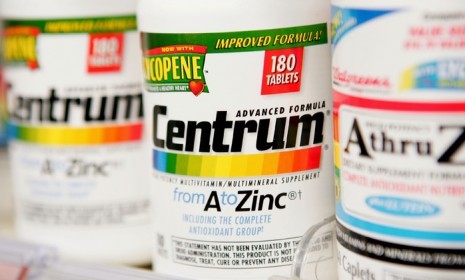Do multivitamins help prevent cancer?
A new study suggests a daily supplement lowers cancer risk in men by 8 percent

A free daily email with the biggest news stories of the day – and the best features from TheWeek.com
You are now subscribed
Your newsletter sign-up was successful
The question: Scientists at Brigham and Women's Health hospital and Harvard Medical School wanted to determine if "America's favorite dietary supplement" — the humble multivitamin — could lower cancer risk in men without dangerous side effects. Prior to this "landmark" study, the science of vitamins "has been skimpy" at best, says Marilynn Marchionne at the Associated Press.
How it was tested: Researchers recruited 15,000 male subjects age 50 and older (when men are more susceptible to cancer) and followed them for more than a decade. Half of the group took a daily multivitamin (Centrum Silver) while the other group took a placebo.
The outcome: Men in the vitamin group were 8 percent less likely to get cancer compared to men who only took placebos. One catch: Multivitamins did not make a difference in prostate cancer rates.
The Week
Escape your echo chamber. Get the facts behind the news, plus analysis from multiple perspectives.

Sign up for The Week's Free Newsletters
From our morning news briefing to a weekly Good News Newsletter, get the best of The Week delivered directly to your inbox.
From our morning news briefing to a weekly Good News Newsletter, get the best of The Week delivered directly to your inbox.
What the experts say: "The study provides the first very nice piece of evidence that a well-balanced — not overdose, not mega dose — combination of vitamins and minerals seems to have an effect at preventing cancer," says Dr. Boris Pasche, director of Hematology/Oncology at the University of Alabama. And at the very least, we can now say that multivitamins "aren't associated with harm," said Dr. Ernest Hawk, head of the Division of Cancer Prevention & Population Sciences at MD Anderson Center in Houston, Texas. "So it removes the concern that many people had about the use of vitamin supplements."
The lesson: Multivitamins, which are primarily taken to correct or prevent nutrition deficiencies, may provide a modest benefit in reducing the risk of cancer for men. But cancer experts warn that more studies are needed before an official recommendation for multivitamins can be made. In any case, this is good news, as one-third of U.S. adults already take multivitamins.
A free daily email with the biggest news stories of the day – and the best features from TheWeek.com
-
 5 cinematic cartoons about Bezos betting big on 'Melania'
5 cinematic cartoons about Bezos betting big on 'Melania'Cartoons Artists take on a girlboss, a fetching newspaper, and more
-
 The fall of the generals: China’s military purge
The fall of the generals: China’s military purgeIn the Spotlight Xi Jinping’s extraordinary removal of senior general proves that no-one is safe from anti-corruption drive that has investigated millions
-
 Why the Gorton and Denton by-election is a ‘Frankenstein’s monster’
Why the Gorton and Denton by-election is a ‘Frankenstein’s monster’Talking Point Reform and the Greens have the Labour seat in their sights, but the constituency’s complex demographics make messaging tricky